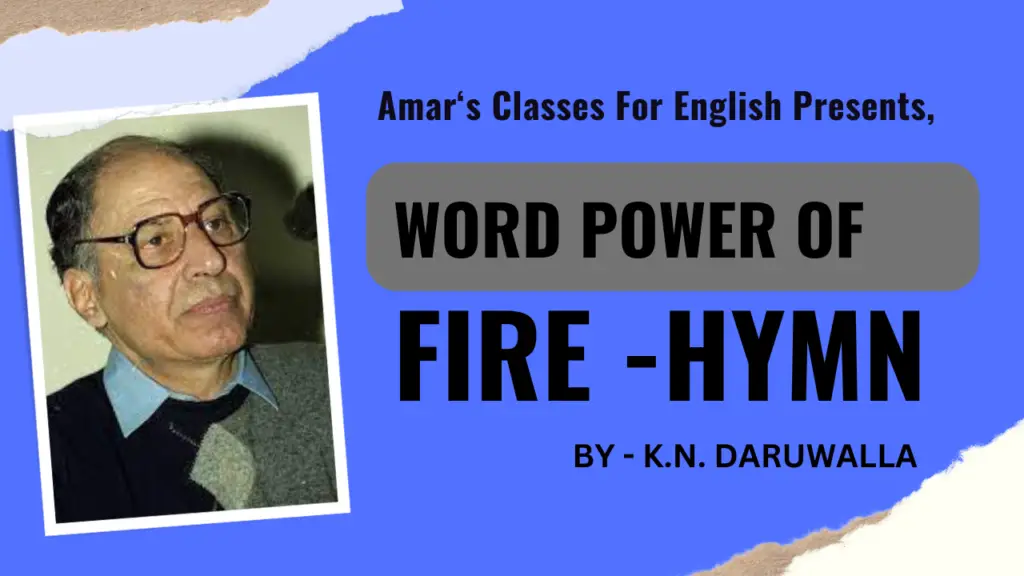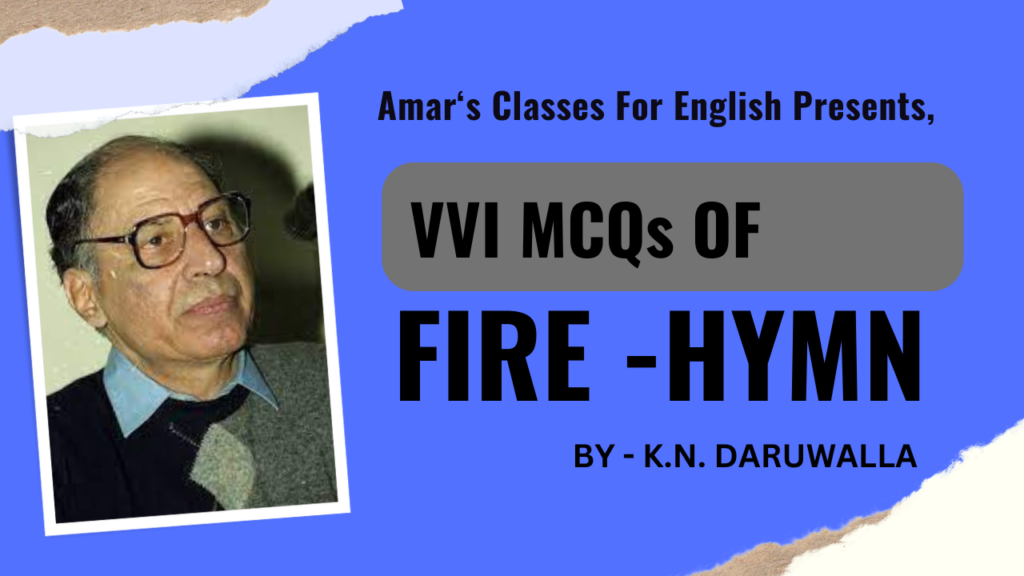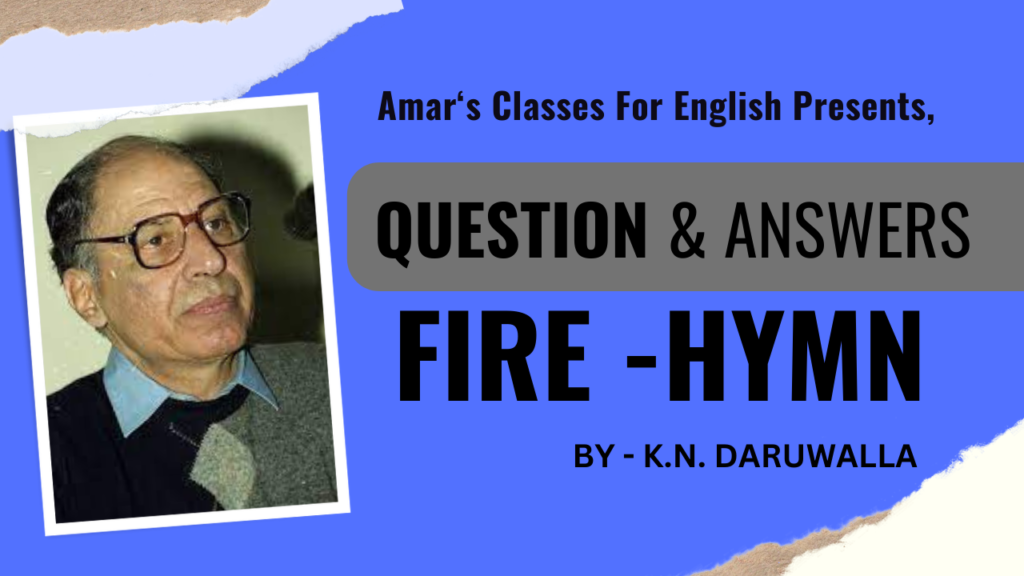
ABOUT POET
Fire- Hymn is written by K. N. Daruwala. His Full Name was Keki Nasserwanji Daruwalla. He was Born in 26 January, 1937 in Lahore, Punjab, PAKISTAN but he has Indian Citizenship. He was an Indian- Anglo Poet and short story writer. He was awarded The Sahitya Akademi Award in 1984 for his Poetry, THE KEEPER OF THE DEAD and Padma Shri Award in 2014. His Important Works are , Under Orion, The Keeper of the dead, Landscapes etc.

SUMMARY
Fire- Hymn is written by Keki. N. Daruwala. In this poem the poet describes the scene of a burning Ghat. One day, when the speaker was a child, he and his father passed by a burning ghat near the river bank. The fire had died out. The embers had lost their hot redness, and were now covered with grey ash. There were half-burnt limbs and fingers of a body. The narrator’s father pointed out that sometimes fire was negligent. It forgets to burn the dead completely. The speaker was pained. He decided to save the fire from the sin of forgetfulness. Twenty years later, the narrator’s eldest child died. He consigned his body to fire and saw that the fire burnt it completely. The Fire-Hymn forgave his non-Parsi act because it appeared that he had done so under compulsion and not willingly. The Tower of Peace was thousand miles from there. The narrator felt his purpose was defeated. He took a vow to save the fire next time from the sin of forgiveness.

WORD POWER
- Hymn : धार्मिक गीत
- erupted : भड़क उठना
- scuttled : बौछार
- strolling : इधर उधर घूमना
- embers : लकड़ी या कोयले का टुकड़ा जो जलते नहीं है लेकिन फिर भी लाल हो जाता है
- debauchery : अपना काम सही से नहीं करना /अनैतिक व्यवहार
- stubs : अधजला / पूरा न जला हुआ
- zoroastrian : पारसी धर्म
- consigned : समर्पित करना / भेजना
- Tower of Silence : एक ऐसा जगह जहा पारसी धर्म के लोगो को मरने के बाद रख / टाँग दिया जाता है |
- rebellious : नियमो का विद्रोह करने वाला / सोचने वाला
- swore : कसम खाना
- phosphorescence : ऐसा आग का रौशनी जिससे गर्मी न आये
- wandering : भटकना
- frightened : डरा हुआ
- half- cooked limbs : आधा जला हुआ अंग
- knot :गांठ
- forgetfulness : भूलना / भूल
- forgiving : माफ़ करना

VVI MCQs
1) “Fire-Hymn” is Written/Composed by ______
- John Donne
- Walt Whitman
- K. N. Daruwala
- John Keats
2) K.N.Daruwala was born in________
- 923
- 1937
- 1947
- 1967
3) K.N.Daruwala died in___________
- 1930
- 2018
- 2013
- Not Death
4) He received ________award in 1984
- Nobel Prize
- Padam Bhushan
- Sahitya Academy
- Pulitzer
5) K.N.Daruwala was a __in religion.
- Zoroastrian
- Sikh
- Christian
- Muslim
6) The grey ash swallows all half___
- Cooked limbs
- Full cooked limbs
- Raw cooked lims
7) K.N. Daruwalas was awarded________in 2014
- Nobel Prize
- Padam Shri
- Sahitya Academy
- Pulitzer
8) _______are frightened by wandering ghost light.
- Passengers
- Passers-by
- Travelers
- Tourist
9) The poet swore to save fire from the sin of_______
- Forgetfulness
- Forgiveness
- Boldness
- Kindness
10) The poet consigned his first born child to the______
- Fire
- Well
- River
- Flame
11) The nearest ‚Tower of Silence was a _________away.
- Thousand miles
- Hundred miles
- Twenty miles
- Sixty miles
12) ________was a thousand miles away from his house
- Tower of Silence
- River
- Sea
- House
13) In this poem, he describes a burning__________
- House
- Flat
- Ghat
- Forest
14) One day the poet was wandering with his____
- Father
- Grand-father
- Uncle
- Friend
15) _____do not burn the dead body.
- Parsi
- Hindu
- Sikh
- None of these
16) K.N.Daruwala was an____________ Poet.
- Indian-Anglo
- NRI
- British
- American
17) K. N.Daruwala has written over_____books
- Twelve
- Eleven
- Twenty
- Thirty
18) He consigned his first born child___years ago.
- Twenty
- Thirty
- Forty
- Sixty
19) The grey ash that__________ all
- Swallows
- Nibble
- Cut
- Throw
20) The second time the speaker swore to save fire from the sin of__
- Forgetfulness
- Forgiveness
- Boldness
- Kindness
21) The nearest_______was a thousand miles away
- Tower of Silence
- Golden Temple
- River
- Burning ghat
22) The poet saw the embers losing their cruel____
- Redness
- Hotness
- Kindness
- Softness
23) The embers losing their____redness.
- Cruel
- Kind
- Hot
- Soft
24) The Poem describe the scene of ____ In Fire-Hymn
- Human Society
- War
- Burning Ghat
- Violence
25) The term ‘Zoroastrain’ in Fire-Hymn is stand for
- Hindu
- Muslim
- Parsi
- Roman Catholic
26) The Speaker in poem Fire-Hymn swears :
- A. Once
- B. Twice
- C. Thrice
- D. None of these
27) Daruwalla’s poetry is ‘a totally_____ recording to subjective responses’
- A. Symbolistic
- B. Idealistic
- C. Impressionistic
- D. None
28) The term ‘debauchery’ in Fire-Hymn’ stand for
- A. moral behaviour
- B. disgusting behaviour
- C. immortal behaviour
- D. None of these
29) The _____ forgets its dead because sometimes it leaves the dead body half burnt.
- A. Man
- B. Woman
- C. Five
- D. None of these
30) The poet sees the red hot ______
- A. Iron
- B. embers
- C. face
- D. None of these

VVI QUESTION & ANSWERS
1) How did the passer-by get frightened?
Ans- The passer-by got frightened to see the fire and the dreadful scenes at the ghat.
2) Which event does the expression ‘the burning ghat’ refer to ?
Ans- The expression “the burning ghat” refers to the place where dead-bodied are usually cremated.
3) Where do you think is the ghat located?
Ans- The ghat is located near the bank of a river.
4) What does the speaker see/observe in the morning at the ghat?
Ans- The speaker observes pieces of wood and coal, not burning but are still red in the morning at the ghat.
5) Why does he say that the redness of the fire is cruel?
Ans- He says that the redness of the fire is cruel because it stings and burns. It spares nothing.
6) In what sense does the fire forget its dead?
Ans- The fire forgets its dead when it leaves the body half-burnt. The speaker fells it as the fire’s immoral behaviour
7) Why does the speaker reveal his religious identity?
Ans- The speaker is a Zorastrian. They do not burn thier dead. They leave their dead on the Tower of Silence. He reveals his religious identity to make this point clear.
8) Why did he consign his firstborn to the flames?
Ans- He consigned his firstborn to the flames because the nearest “Tower of Silence”, Where the Parsis dispose up their dead-bodies, was a thousand miles away. So, he could not lodge (dispose of) the dead-body of his first-born-child on that place.
9) What did the firm hymn say to him?
Ans- The firm-hymn said to the speaker that he had foregiven him and now it has taken oath to overlook and pardon him this time for the sin he committed.
10) What are the different forms and roles of fire at the ghat?
- erupted phosphorescence
- wandering ghost lights
- embers losing their cruel redness
- grey ash that swallows all
11) How does the ghat appear to the common people?
Ghat appears to be haunted by ghosts. It is a very scary place.
